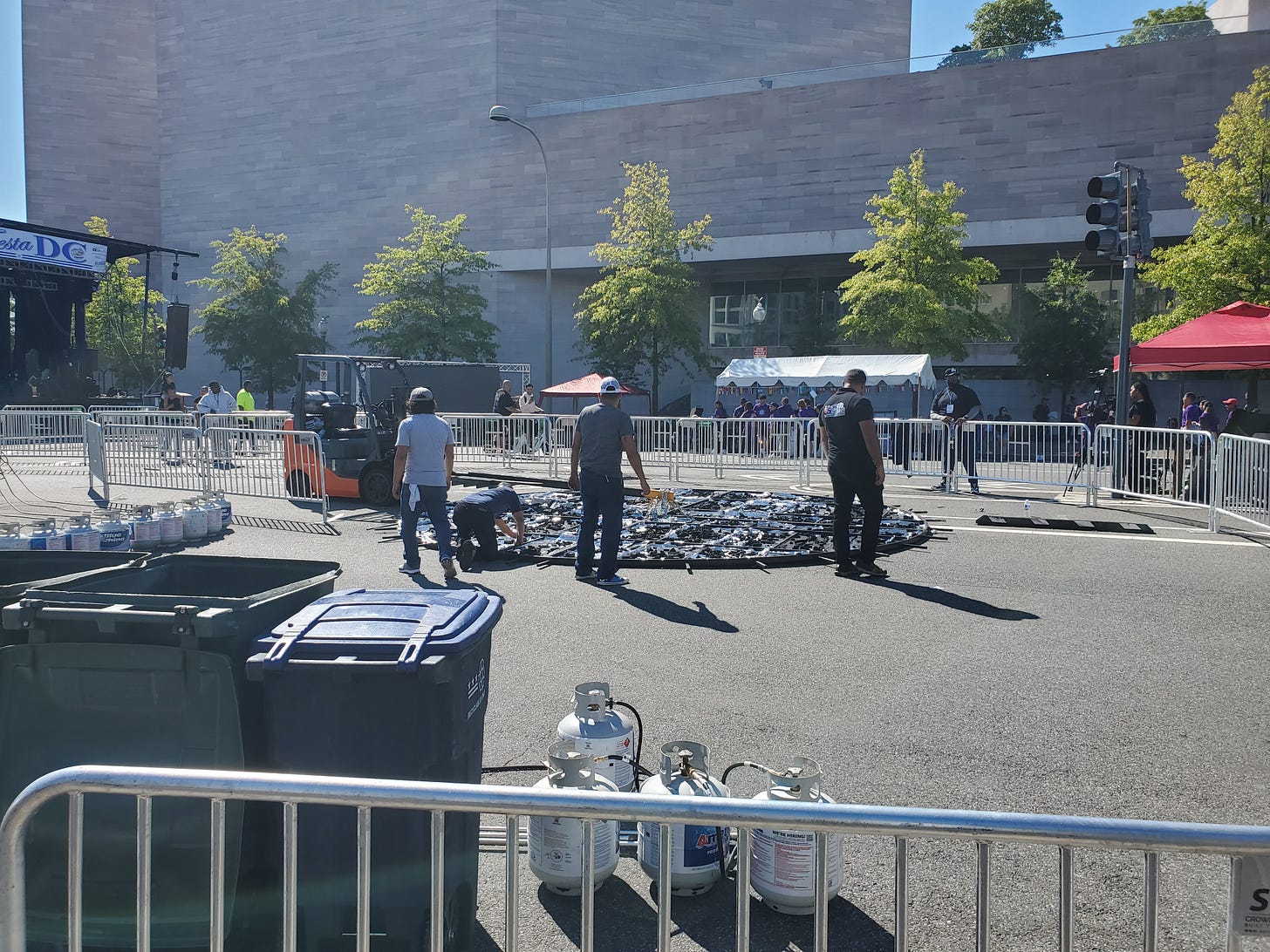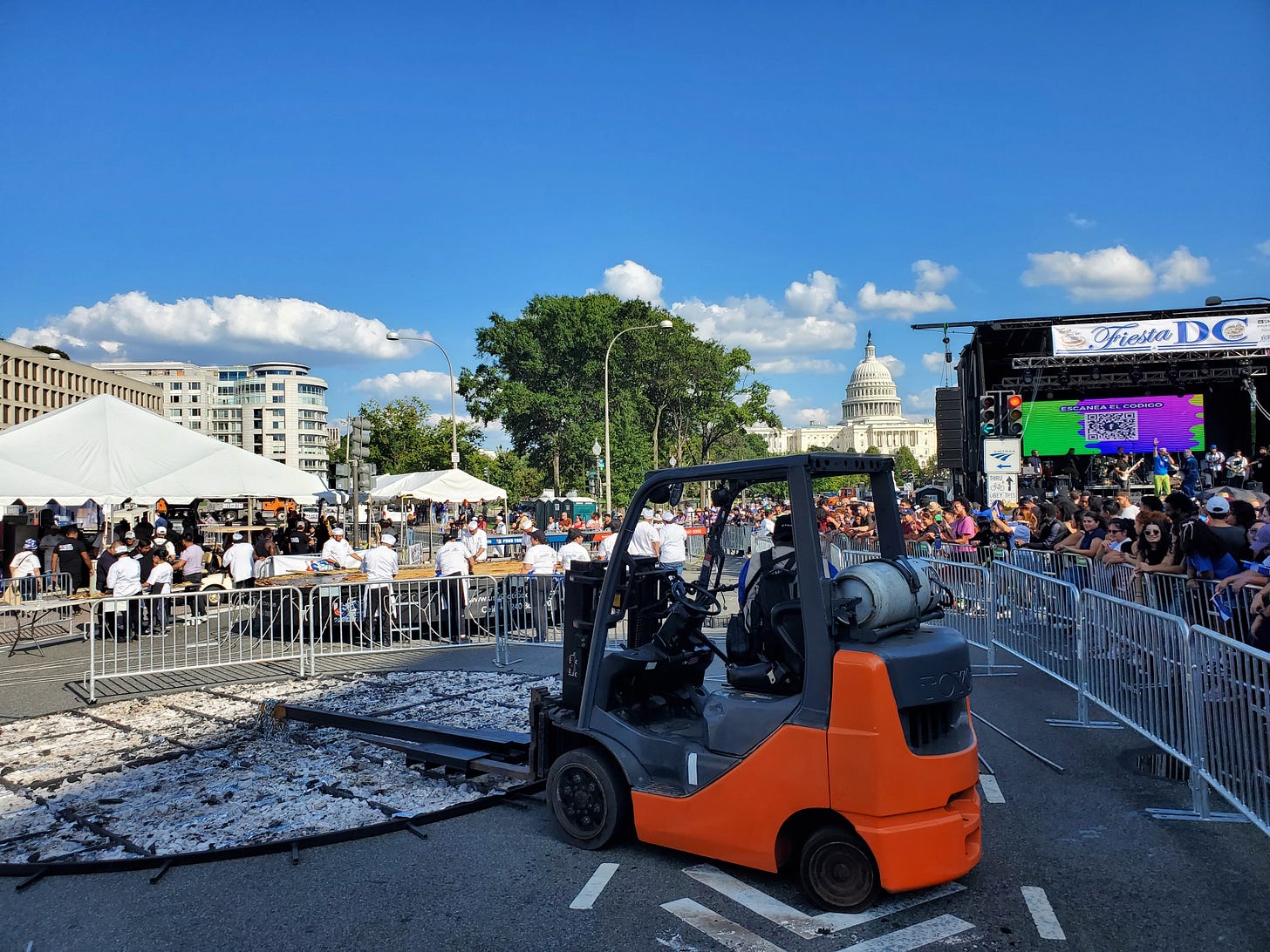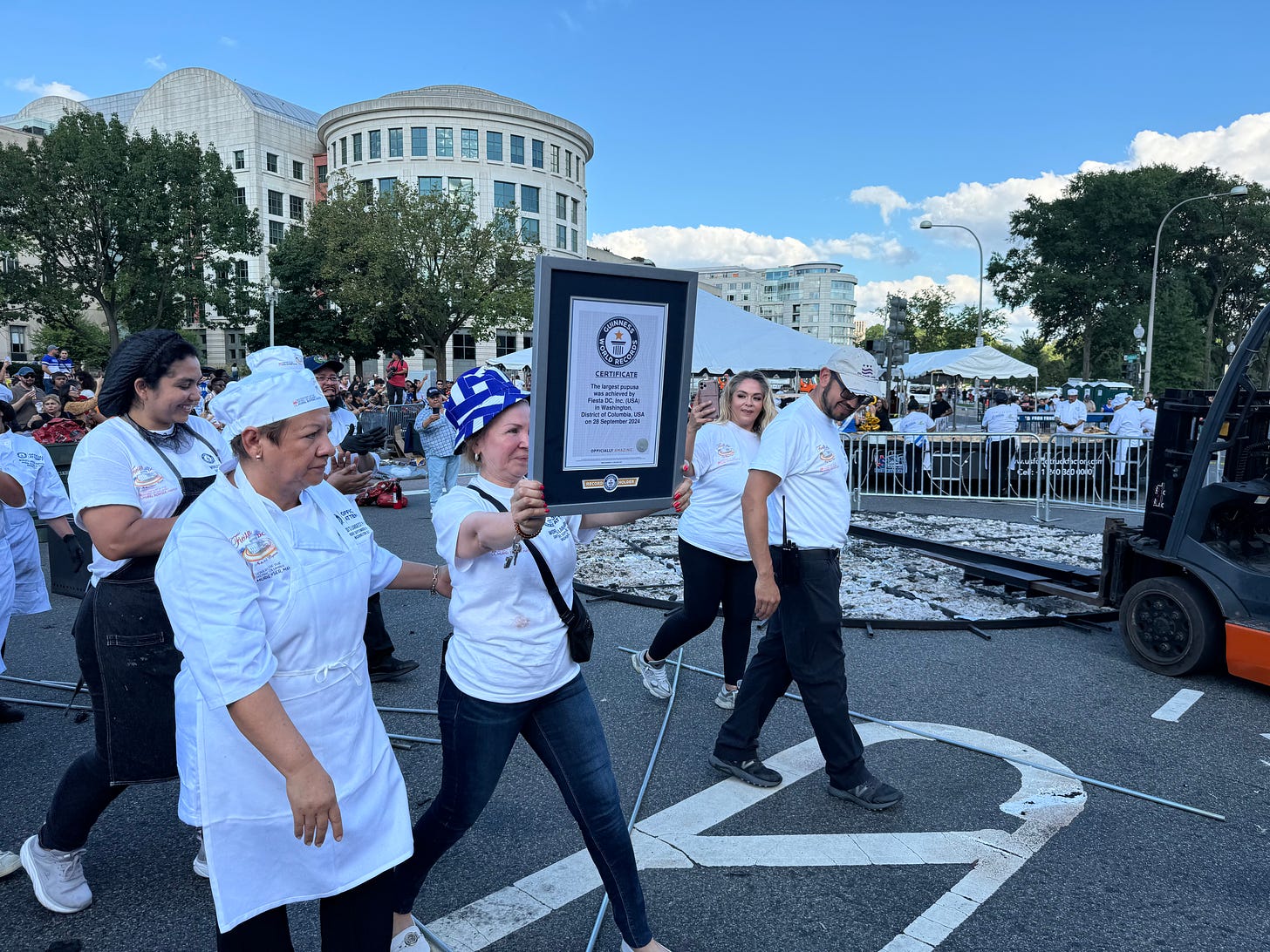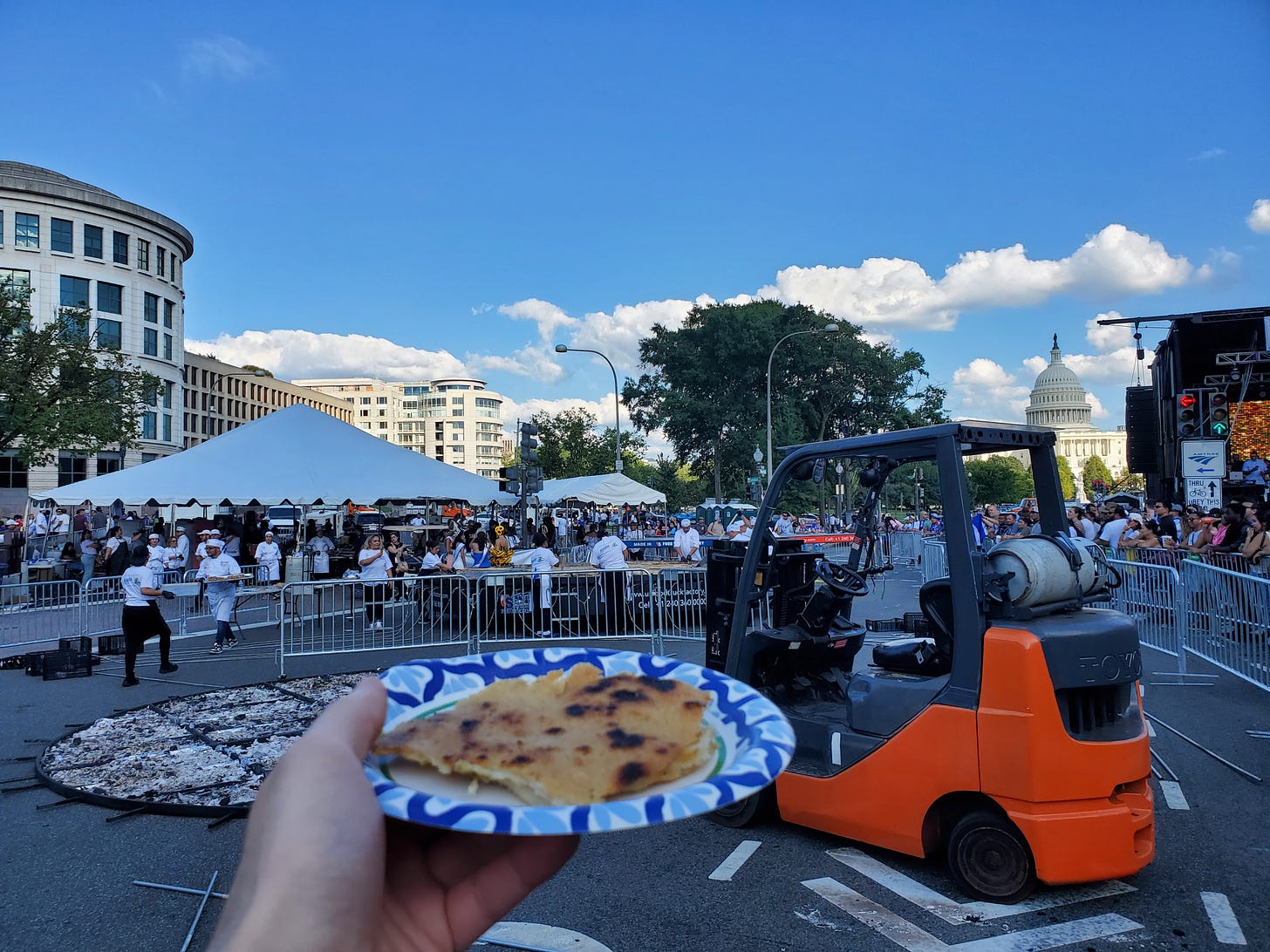Bigger And Better
We should be proud of the multitudes our country contains. Plus, the world's largest pupusa.
This is America.
On Saturday, my wife and I were in D.C. for the day, and walked to Fiesta DC, a Latino street festival. We went there because I’d come across a writeup of one of the big events: an attempt to make the world’s largest ever pupusa, which would be verified by a representative from Guinness World Records.
Pupusas are an iconic food item, originally from El Salvador, a country from which many immigrants have settled in the D.C. area. (A pupusa is basically a stuffed corn tortilla, with cheese and various add-ins like chopped pork, vegetables, or beans, but read the Wikipedia entry on it if you aren’t familiar with it.)
There are pupuserias all over the region—mostly in the suburbs—and most of them are pretty casual neighborhood spots. I guess they fill the same sort of niche for (mostly) Latino/Hispanic customers as those strip-mall pizzerias in New Jersey do for Italian-Americans (and many more—maybe Latin American food will achieve the same saturation as Italian food, but I don’t think it has quite yet. I wonder, in what year did the vast majority of Americans all know what pizza was?).
The previous record for the world’s largest pupusa was set in 2022, in El Salvador. But thanks to this effort, which involved dozens of chefs from pupuserias around the region, the record now resides in the United States.
The articles about the record-setting attempt were not terribly clear about the logistics, and neither was any information at the event itself (there was none, really; I mean, would it kill event organizers to print up a sign that says…something?). But we hung around the giant chefs’ tent and 20-foot custom-made griddle, trying to figure out the timeline, and just watching the scrum. Dozens of sheet pans of shredded cheese and dough, preparing, setting up, back and forth. It was hot and muggy out, but it was fun standing there awhile.
One fellow in the crowd who I asked said were just supposed to come back in three hours or so to buy a piece of the finished pupusa. But the articles had mentioned tickets. Finally, a woman started handing out tickets, which actually said a sample of the finished item was free (and at your own risk—liability boilerplate, of course). Now that’s cool:
Oh yeah—and because a 20-foot anything can’t be flipped, there was, in addition to the griddle, a 20-foot grate covered in charcoal, which would be craned up just above the giant pupusa to cook the top.
At this point we went to the National Gallery (D.C.’s free pop-in-and-out-at-your-leisure museums are such a nice thing to have) and then met a friend for lunch. We all went back around 3pm to see the progress. They had just finished cooking the giant pupusa and were beginning to cut it up and serve little pieces.
And we also saw the moment the Guinness official presented the world record plaque to a group of festival representatives.
It took awhile standing in the crowd for a piece to reach us. They made a little game of it, selecting the loudest cheering section of the crowd to deliver a tray of pieces. And it turned out they were both free and did not require a ticket. So I’ve got a little souvenir. It’s really cool to just be in the middle of something like this.
And there is a piece of a little narrow slice of history.
That video up at the top is from the opening moments of the festival. They played the Star-Spangled Banner, followed what I think were the national anthems of several Latin American countries. I bet there are some folks who would look at these cultural festivals as a setting-apart from America, rather than a celebration of its multitudes. I don’t think so.
I’ve run into the argument—and have argued with it—that the D.C. region, and particularly Northern Virginia, aren’t really “real places.” Part of that is the transience of the region, with a lot of military and government folks coming and going. It’s probably true that the population is not as permanent as many other metro areas. But there’s also, with some of the people who allege this, a resentment of the region’s diversity. Some people feel that at best diversity is a lifestyle amenity. They don’t see it as enhancing the culture of a place or forming a new culture, but rather as having a fragmenting effect and making it more difficult to form communities. (And yes, some of the people who say these things are trying to elevate actual racism.)
I don’t really think about “diversity” in an abstract sense or a “politically correct” sense. I just think it’s really damn cool to live in a part of America that people from over 100 of the world’s nations have chosen to call home. I don’t like immigrants because their food is good or because I feel white guilt or whatever. I’m proud of my country and my region for being the kind of place where we can set a world record for a food item from another country. For being the kind of place where an Ethiopian winery can faithfully recreate a wine from that country, and serve our Ethiopian community but also introduce it to all kinds of other people. It’s a mistake to see these things as consumption opportunities. At best, they’re ways to teach yourself about the world. And also, they’re not really about or for us.
I understand the argument that immigration should have limits, and certainly that it should be done in a legal and orderly manner. What I do not understand is Americans who seem to resent that our country—or their region or community—is a highly desirable place to live. Where is the pride and patriotism in that? What company would be upset at making something so popular that everyone wants it?
A world record for a foreign food, set here in the nation’s capital, with a crowd of every age and race looking on, won by dozens of chefs from small, family-owned restaurants out in the region’s interesting, complex suburbs, binding us all together around a great table, like a secular sacrament.
What the hell is more American than that?
Related Reading:
Don’t Patch The Hole In The Wall
What If You’re the Placeless One?
Thank you for reading! Please consider upgrading to a paid subscription to help support this newsletter. You’ll get a weekly subscribers-only piece, plus full access to the archive: over 1,100 pieces and growing. And you’ll help ensure more like this!











"I don’t really think about “diversity” in an abstract sense or a “politically correct” sense. I just think it’s really damn cool to live in a part of America that people from over 100 of the world’s nations have chosen to call home. I don’t like immigrants because their food is good or because I feel white guilt or whatever. I’m proud of my country and my region for being the kind of place where we can set a world record for a food item from another country. "
Excellently stated! Thank you for this article, I find that the diversification of suburbia is one of the most underreported topics out there. I hear people describe suburbs as all white places with nothing but chain restaurants and look deeply confused; especially when I look at who my neighbors are and the assortment of restaurants nearby. I'm closer to multiple sushi restaurants than I am to an olive garden or red lobster. I may have to look up where the closest pupuseria is to my house, I know I've seen a few spots while driving around.
"I’m proud of my country and my region for being the kind of place where we can set a world record for a food item from another country."
What a great line! And I do love pupusas. I discovered them thanks to Midway Airport in Chicago, where I had to pick somebody up. There's a great pupuseria located nearby, so we stopped in for a snack. I liked the place so much that I included it in my novel, "Social Distancing." Just another example of cultural cross-fertilization.